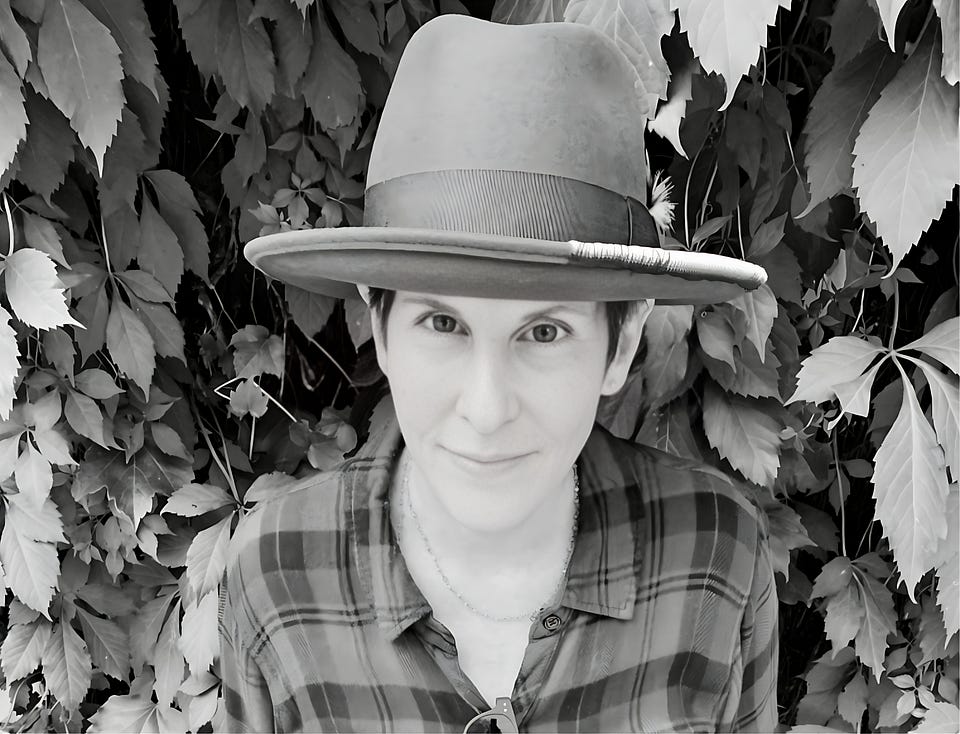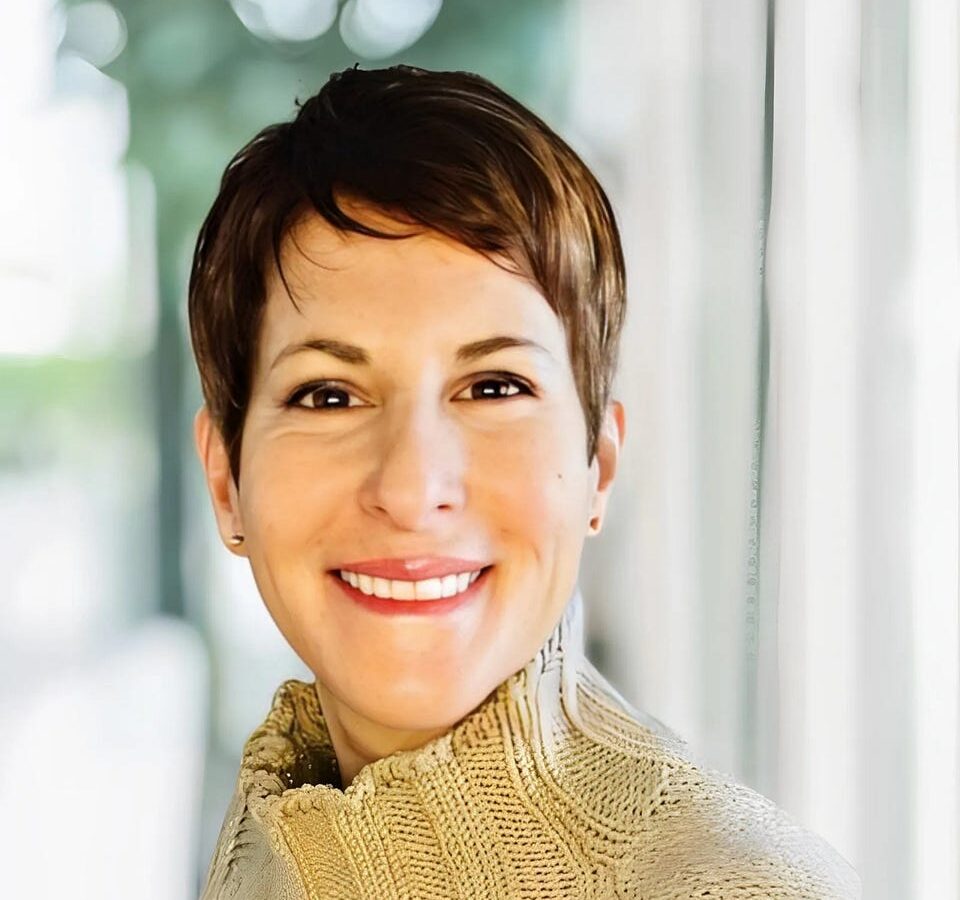Be open to the possibilities. When you shift your mindset to being more open to the possibilities, you will find more opportunities will present themselves. When you approach things coming from a place of fear of failure, you’re sending out a vibe to other potential collaborators that you’re unwilling to try due to the fear of failure.
The Fear of Failure is one of the most common restraints that holds people back from pursuing great ideas. Imagine if we could become totally free from the fear of failure. Imagine what we could then manifest and create. In this interview series, we are talking to leaders who can share stories and insights from their experience about “Becoming Free From the Fear of Failure.” As a part of this series, I had the distinct pleasure of interviewing (Your name here).
Amy Goldberg is the founder + CEO of Push Back Productions, a company created to create, with the understanding that sometimes you need to push back to push forward. Amy combined her skills and experiences as an accomplished producer, writer, entrepreneur, business strategist, and yes, even her influence as a health, fitness, and wellness warrior, to enrich and enhance all aspects of the creative work that she and her team produce.
Thank you so much for joining us! Our readers would love to “get to know you” a bit better. Can you tell us a bit about your ‘backstory’?
I was a curious kid turned curious adult. I looked around a lot to see what was going on. To see how I could inspire and enhance things. People. Initiatives. Communities. Audiences. Groups. That kind of thing. My curiosity came from my family influences. Growing up with artists, entrepreneurs, writers, and career professionals gave me a kind of foundation in which to strive for. I wasn’t really guided to do any one thing. It was more about my observing what was around me, and then seeing what would resonate. Ultimately, I landed on two very clear, yet very different paths. One being, Arts & Entertainment, and the other, Health & Wellness. Yep, those were the two areas that excited me. Both offered ways where I could be creative. And being creative was the underpinning for everything that I did and still do.
Can you share with us the most interesting story from your career? Can you tell us what lessons or ‘take aways’ you learned from that?
Ha, there are many. Blazing a trail is something that I enjoy doing. I remember when I started my own wellness company. Wellness companies hadn’t come on the scene. I was one of the first. It felt like the wild (wild) west. What I hadn’t realized was the need to convince company leadership of the importance of employee wellbeing. Every step of the way was a push-pull to get true buy-in so that we could make real and lasting advancements in the health, fitness, wellness, and emotional wellbeing of people in the workplace. It was evident that I was in it for the long game. Attempting to shift a company culture was an uphill battle that would take years if leadership wasn’t all in. And yet, this is where patience and grit came into play. I was determined to dig in and make a change for the better. What surprised me, as well as helped to reinforce the passion that I had, was that I knew it would benefit a lot of people. And ultimately it absolutely did.
You are a successful leader. Which three-character traits do you think were most instrumental to your success? Can you please share a story or example for each?
Patience, grit, and kindness are my three-character traits that have served me well. I can’t tell you how many times I’ve embarked on something only to be told that maybe I should consider doing something else. Sometimes that’s great advice, and yet often I find it’s coming from a place of short-sightedness. An unwillingness to stick it out and get down to doing the tough work. I get it, slugging it out isn’t easy. When you start to create something that you know feels right, and the thinking is there, you keep going. That’s where patience and grit come into play. I love what my older brother use to say; “Hang in until luck squeezes in.” And kindness. That’s in all that I do. Leading with kindness serves everyone. Everyone benefits. You can very effectively use your words kindly in every situation. Yes, every situation.
Ok, thank you for all that. Now let’s shift to the main focus of this interview. We would like to explore and flesh out the concept of becoming free from failure. Let’s zoom in a bit. From your experience, why exactly are people so afraid of failure? Why is failure so frightening to us?
In my experience, the main reason people are afraid of failure is that they do not want to look or appear foolish. The embarrassment of failing unfortunately can have a debilitating effect on people. To the point where they refuse to try new things so that they won’t fail. This kind of thinking is paralyzing our ability to be creative.
What are the downsides of being afraid of failure? How can it limit people?
It stifles creativity and the ability to grow and learn. It places invisible handcuffs on us to keep us from releasing and letting go. It also hinders our ability to think differently and to try more things, and new ways of doing things.
In contrast, can you help articulate a few ways how becoming free from the free of failure can help improve our lives?
Failure once realized as being a way to freedom, opens the mind and willingness to want to expand and create more. If one didn’t know that failure was, in modern times, considered a failure, then one would simply know that it’s an opportunity for growth and learning. One’s mindset, and the shift in thinking around failure, will set one sorrowing.
We would love to hear your story about your experience dealing with failure. Would you be able to share a story about that with us?
I’ve been involved in helping to launch several start-ups throughout my career. As you can appreciate it’s a tough go trying to secure funding and show proof of concept while trying to get something off the ground. There’s a lot of jumping through hoops. It’s ironic as you need patience to create and develop something, and yet speed is required if you want to get your product or service to market. There’s a lot of juggling that goes along with creating. I’ve been fortunate to have connected with great people where things just worked — and then there have been other colossal failures that primarily came down to several different understandings of the vision. During colossal failures — although frustrating, there are important learnings that come from these experiences. You learn very quickly ways to do things better. Much better.
How did you rebound and recover after that? What did you learn from this whole episode? What advice would you give to others based on that story?
Find what excites you. What you’re willing to put the time into. You need to enjoy the process along the way. If you’re just in it for the end results, you’re probably going to struggle, and you’re probably going to make poor decision. Get really clear with what you want to achieve. How are helping to improve the lives of people or provide a service that will benefit others. Take time pulling your team together. The people you work with, matter. Every one of them. Make sure you all have the same understanding of what it is that you want to achieve and accomplish.

Fantastic. Here is the main question of our interview. In your opinion, what are 5 steps that everyone can take to become free from the fear of failure”? Please share a story or an example for each.
- Be open to the possibilities. When you shift your mindset to being more open to the possibilities, you will find more opportunities will present themselves. When you approach things coming from a place of fear of failure, you’re sending out a vibe to other potential collaborators that you’re unwilling to try due to the fear of failure.
- Everyone else is too busy worrying about their own life, to worry about whether you’re going to fail or not. Trust me when I say that no one is watching you or wanting you to fail. This is a perspective that we create to reinforce our need to not want to fail. It’s in the ‘not trying’ that will lead you to eventually be disappointed that you didn’t try in the first place.
- Free your mind and the wisdom will follow. When you free your mind from the idea that things need to be perfect, it enables you to find the confidence to do more, be more, and act more.
- Stretch your imagination. When you take the idea that you may fail out of the equation, it allows you to stretch your imagination. It enables you to ask; ‘What if.’ What if you try it anyway.
- In 100 years, no one will care. When you’re long gone, no one will remember your failures. So, ease your mind and break free from holding yourself back from trying.
The famous Greek philosopher Aristotle once said, “It is possible to fail in many ways…while to succeed is possible only in one way.” Based on your experience, have you found this quote to be true? What do you think Aristotle really meant?
I don’t believe that there’s only one way in which to succeed because being successful means different things to different people. One needs to define what success looks-like for them. However, one needs to be willing to fail many times, in many ways, to achieve success.
You are a person of great influence. If you could inspire a movement that would bring the most amount of good to the greatest amount of people, what would that be? You never know what your idea can trigger. 🙂
I would inspire a movement of Kindness. Kindness creates a domino effect. One act of kindness, no matter how small creates a chain reaction for good. In fact, I would call it; Act In Kindness. Every small decision you make that involves a display of kindness, changes your disposition, whereby you’re more apt to lead with compassion.
We are blessed that some very prominent leaders read this column. Is there a person in the world, or in the US, with whom you would love to have a private breakfast or lunch, and why? He or she might just see this, especially if we tag them 🙂
Maria Schriver is a woman that I admire. She’s evolved and involved in initiatives that I can identify with. Not that long ago she created The Sunday Papers, inspiring hearts, and minds. Their focus is to publish news and views that “rise above the noise and move humanity forward.”
How can our readers further follow your work online?
Website: https://www.pushbackproductions.com
Podcast: https://www.youtube.com/@believeinpeople
Instagram: @amygoldberg3
LinkedIn: https://www.linkedin.com/in/amysgoldberg/
This was very inspiring. Thank you so much for the time you spent on this. We wish you only continued success.


